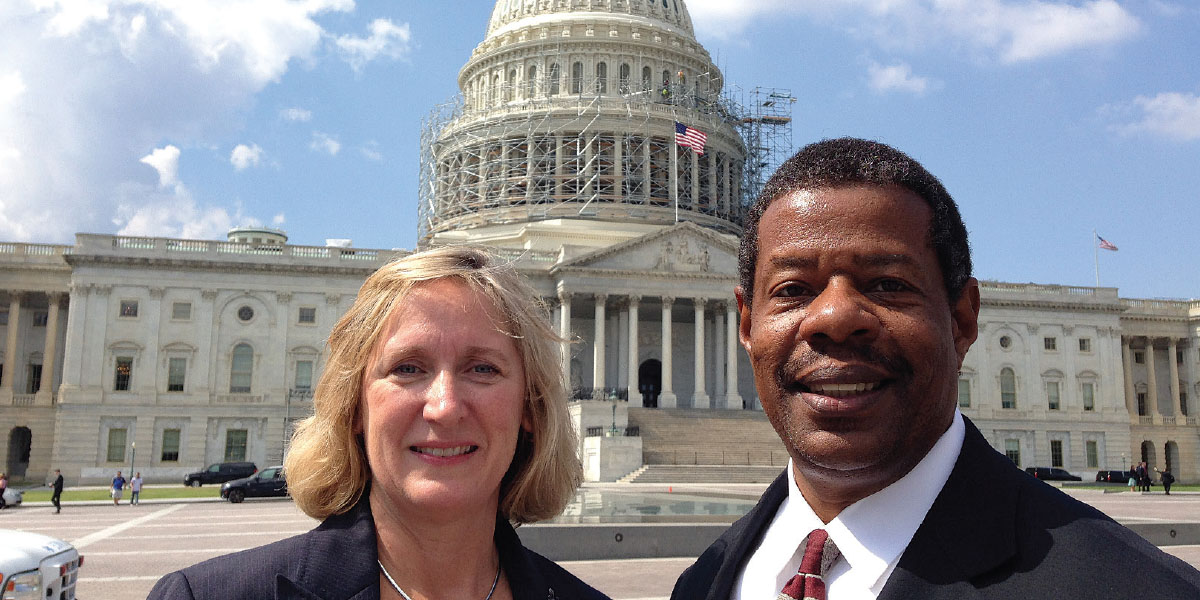In September, members of NACUBO’s four constituent councils—Community Colleges Council, Small Institutions Council, Comprehensive and Doctoral Institutions Council, and Research Universities Council—convened in Washington, D.C., to discuss the challenges and opportunities confronting higher education business officers. Council members engaged in discussions about their professional development needs, changes in CBO demographics, and potential programming for specific NACUBO member segments.
The councils’ suggestions will influence upcoming events, publications, webcasts, and other Web resources, among other products and services. Additionally, council members provided feedback to staff-led presentations on the Blank Slate Project and a new higher education economic models project.
While in Washington, council members also called on 64 members of Congress to help their elected officials understand the substantial expenses related to the operations of colleges and universities. Joined by several NACUBO staff and board representatives, the volunteers discussed pending policy proposals for comprehensive tax reform, reauthorization of the Higher Education Act (HEA), and other priority concerns.
Recent webcasts featured two topics that are of great interest to chief business officers.
- Effective Communication Between Trustees and Chief Business Officers. Speakers offered advice about the type of information required for productive discussions and enhanced decision making between CBOs and the board of trustees, and delivery methods CBOs can use to provide the information that the boards need. The webcast was a collaborative program with the Association of Business Administrators of Christian Colleges and the Association of Governing Boards of Universities and Colleges.
- Taking a Disciplined Approach to Asset Allocation and Rebalancing. What changes did your organization make to asset allocation as a result of the recent financial crisis? During a recent webcast on asset allocation and rebalancing, speakers discussed how during the financial crisis, institutions could have implemented innovative techniques that apply a unique approach to not only asset allocation, but also rebalancing. Attendees learned about the results of a study that evaluated the impact of various rebalancing strategies through the financial crisis and recovery, and how each strategy affected the volatility and return of a diversified portfolio.
To watch a recording of these webcasts, visit the On Demand section of the Distance Learning page at www.nacubo.org.
On-Demand Series on Sustainability Issues
NACUBO will release 30-minute, on-demand videos to help you better understand issues related to facilities and energy, and expanding campus financial duties beyond the balance sheet.
Released throughout the year and sponsored by the NACUBO Sustainability Advisory Panel, the videos are free to NACUBO members; nonmembers pay $49 per video.
Currently available is Definitions and Strategies for Sustainability, a video featuring Arizona State University, which is considered to be a leader in the global movement to address sustainability challenges. Upcoming recordings will include:
- Food Recovery Network: How Campuses Can Fight Waste and Feed People.
- Strengthening University Environmental Leadership.
For more information, visit the On Demand section of the Distance Learning page at www.nacubo.org.
The Key Facilities Metrics Survey—which was sent in July to all NACUBO and APPA members—is due Dec. 15, 2014. NACUBO and APPA developed the joint survey to improve the knowledge base of higher education finance and facilities leaders. It also will help leaders establish an internal trend line for better understanding how their facilities stack up on key financial and environmental benchmarking measures.
NACUBO’s Sustainability Advisory Panel provided input on the survey—a set of five simple questions that relate to energy efficiency, water consumption, and waste streams. The aim of this survey is to prepare the business office to track basic facilities data on an annual basis, the thinking being that where measurements occur, improvements are more likely to follow.
The Key Facilities Metrics Survey will complement APPA’s more in-depth annual Facilities Performance Indicators Survey of colleges, universities, K–12 organizations, and other educational entities. The FPI captures more than 50 core elements of successful facilities management and produces the only report readily available on the costs and practices of facilities operations at educational institutions. The FPI allows extensive comparisons of average costs for different types of space and institutions, and empowers campus leaders with the vital data and reporting tools needed to measure operations and performance, identify capital asset realities, and lead a successful facilities strategy that supports the institution’s mission.
NACUBO’s virtual workshops and conferences allow you and your team to access from your home or office, videorecorded sessions and materials from live programs. Here are some programs that are available:
- 2014 NACUBO Annual Meeting, available until Feb. 1, 2015.
- 2014 Student Financial Services Conference, available until March 1, 2015.
- 2014 Higher Education Accounting Forum, available until April 1, 2015.




